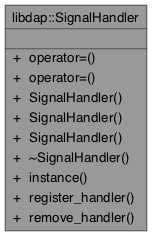#include <SignalHandler.h>

Public Member Functions | |
| SignalHandler & | operator= (const SignalHandler &)=delete |
| SignalHandler & | operator= (SignalHandler &&)=delete |
| SignalHandler ()=default | |
| SignalHandler (const SignalHandler &)=delete | |
| SignalHandler (SignalHandler &&)=delete | |
| virtual | ~SignalHandler ()=default |
Static Public Member Functions | |
| static SignalHandler * | instance () |
| static EventHandler * | register_handler (int signum, EventHandler *eh, bool ignore_by_default=false) |
| static EventHandler * | remove_handler (int signum) |
Friends | |
| class | HTTPCacheTest |
| class | SignalHandlerTest |
Detailed Description
Singleton to handle signals. This class adapts the C-style function call interface to one suited for C++. This class records a signal's old action/handler when it installs new handler. When a signal is caught, the new handler (registered with this class) is run and then the old action/handler is performed. This ensures that when libdap++ is embedded in code which has a handler for a signal such as SIGINT which does something other than the default, that thing, whatever it may be, gets done.
This class treats signals it registers (using the EventHandler abstract class) differently than ones registered using the signal() or sigaction() system interfaces. If the register_handler() method is called and an instance of EventHandler is already bound to signum, then the old EventHandler is returned. However, if there's an existing handler that was set up with sigaction(), ..., it won't be returned. Instead it will either be run after the newly registered EventHandler or ignored, depending on register_handler()'s override parameter. This feature may be used only for POSIX.1 signals which cause process termination. They are: SIGHUP, SIGINT, SIGKILL, SIGPIPE, SIGALRM, SIGTERM, SIGUSR1, and SIGUSR2.
- Note
- Based on "Applying Design Patterns to Simplify Signal Handling", Douglas C. Schmidt, 1998, http://www.cs.wustl.edu/~schmidt/signal-patterns.html.
- See also
- EventHandler
Definition at line 66 of file SignalHandler.h.
Constructor & Destructor Documentation
◆ SignalHandler() [1/3]
|
default |
◆ SignalHandler() [2/3]
|
delete |
◆ SignalHandler() [3/3]
|
delete |
◆ ~SignalHandler()
|
virtualdefault |
Member Function Documentation
◆ instance()
|
static |
Get a pointer to the single instance of SignalHandler.
Definition at line 69 of file SignalHandler.cc.
◆ operator=() [1/2]
|
delete |
◆ operator=() [2/2]
|
delete |
◆ register_handler()
|
static |
Register an event handler. By default run any previously registered action/handler such as those installed using sigaction(). For signals such as SIGALRM (the alarm signal) this may not be what you want; see the override parameter. See also the class description.
- Parameters
-
signum Bind the event handler to this signal number. Limited to those signals that, according to POSIX.1, cause process termination. eh A pointer to the EventHandler for signum.ignore_by_default If true, do not run the default handler/action. Instead run eh and then treat the signal as if the original action was SIG_IGN. Default is false.
- Returns
- A pointer to the old EventHandler or null.
Definition at line 86 of file SignalHandler.cc.
◆ remove_handler()
|
static |
Remove the event handler.
- Parameters
-
signum The signal number of the handler to remove.
- Returns
- The old event handler
Definition at line 154 of file SignalHandler.cc.
Friends And Related Symbol Documentation
◆ HTTPCacheTest
|
friend |
Definition at line 88 of file SignalHandler.h.
◆ SignalHandlerTest
|
friend |
Definition at line 86 of file SignalHandler.h.
The documentation for this class was generated from the following files: